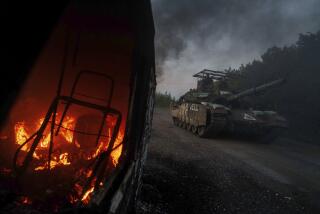Yugoslav Troops Enter Trouble Spots; Takeover Feared : Ethnic crisis: Army calls up reservists to help quell violence. The federal leadership holds emergency session.
- Share via
ZAGREB, Yugoslavia — Federal army tanks and troops in full battle gear moved into ethnically troubled regions of Yugoslavia on Tuesday, fanning fears in the secession-minded northern republics that the army is preparing to impose martial law.
The eight-member federal presidency was locked in its second day of crisis talks in Belgrade, where sources said the Serbian-dominated army was pressing for a state of emergency.
The presidency, which commands the armed forces, adjourned until today after failing to make any headway toward arresting Yugoslavia’s slide toward disintegration.
“Everybody is aware of the catastrophic consequences of a final move into civil war,” Janez Drnovsek, Slovenia’s representative on the presidency, said during a break in the nine-hour meeting.
Federal Defense Minister Veljko Kadijevic said Monday that the federation is already gripped by civil war.
An ominous statement from the army appeared to present Yugoslavia’s six fractious republics with an ultimatum to restore order or face a military takeover, with or without the approval of the collective presidency.
Clashes between Serbs and Croats, Yugoslavia’s two largest ethnic groups, killed at least 18 people in Croatia this week, prompting the army to declare a combat alert and call up reservists.
While the warnings and military movements heightened tensions, Croatian President Franjo Tudjman flew to London for talks with British leaders, suggesting that he sees no imminent danger in leaving his strife-torn republic.
Tank columns that advanced into the republics of Croatia and Bosnia-Herzegovina might have been a response to the army’s order for a heightened state of alert. But citizens in both republics reacted with alarm, and some speculated that the deployments are in preparation for an army coup d’etat.
However, similar fears of a military coup that flashed through Yugoslavia two months ago proved to be exaggerated. The army, whose rank and file is as ethnically diverse as this patchwork nation of 24 million, has generally complied with the orders for limited peacekeeping activities handed down by the federal presidency.
The army has been deployed in trouble spots throughout Croatia for the past two months to deter further clashes between Croatian police and the Serbian minority, which makes up about 11% of the republic of 5 million.
There were no reports of fresh casualties Tuesday in the intensifying ethnic conflict, but roadblocks and unrest spread throughout Croatia.
In the Adriatic town of Sibenik, thousands of people rallied to demand weapons, the official Tanjug news agency said. Croatian-owned businesses in the Serbian stronghold of Knin were looted.
The army expanded its role in the crisis with the deployments and call-ups. Soldiers also took over three major Danube River bridges connecting Croatia and Serbia.
Ethnic Serbs who fled Turkish occupation of the southern Balkan Peninsula settled the mountainous region hundreds of years ago, resulting in an archipelago of Serbian villages within Croatia and Bosnia-Herzegovina. The ethnically mixed region has been a hotbed of Serb-Croat conflicts in recent weeks.
Bosnia-Herzegovina has a mixed population of Serbs, Croats and Muslims.
The military movements into some regions where no ethnic conflicts have been reported, such as the area west of Mostar, raised suspicion that the army might be preparing a takeover that would enhance the power of its Serbian masters.
Hido Biscevic, editor of the main Zagreb daily Vjesnik, claimed that the military hardware has been deployed along what was the northern border of the kingdom of Serbia at its territorial height, showing the current Belgrade leadership’s “dreams of a greater Serbia” after military intervention.
Balkan borders have roamed for centuries, leaving the republics with overlapping historical claims to certain territories.
The army has for months appealed to the presidency for a state of emergency that would amount to martial law. But only the Serbian and Montenegrin representatives on the collective body have supported the proposal.
While a military takeover would halt nationalist efforts to wrest Slovenia and Croatia from the Yugoslav federation in the short term, popular unrest would be likely as soon as the armed clampdown eased. And many fear that the army would fall apart as soon as it intervened on behalf of Serbian interests, because the multi-ethnic rank and file would desert if ordered to use force against countrymen.
But some fear that the officers corps, which is nearly 70% Serbian, might resort to a coup to protect the crumbling federal system on which it depends for its generous pay and privilege.
More to Read
Sign up for Essential California
The most important California stories and recommendations in your inbox every morning.
You may occasionally receive promotional content from the Los Angeles Times.














